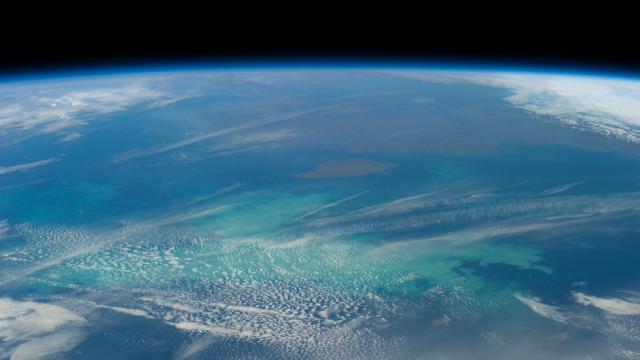Geoengineering, or hacking Earth’s climate system to cool the planet, is a controversial field that promises to either bring on the apocalypse. Now, scientists have discovered a major problem with one popular geoengineering scheme that entails dumping a bunch of iron into the ocean to soak up carbon dioxide. Basically, the plan is not supported by the geologic record.
A phytoplankton bloom in the Bering Sea, as seen from the International Space Station. Image: NASA Earth Observatory
Proponents of “iron fertilization” say that spiking the Pacific Ocean with this critical nutrient will turbo-charge algae, prompting them to draw more carbon out of the atmosphere. This carbon will eventually sink into the deep ocean and become sequestered. While the concept has seen little practical success, and has created at least one international scandal, the dream of cooling our planet with fertiliser while cashing in on carbon credits never seems to die.
But the Earth has already conducted this experiment many, many times. During ice ages, the amount of iron-laden dust settling onto the surface of the Pacific Ocean spikes. By examining the geologic record, scientists might be able to determine if this wacky idea actually works.
That’s exactly what a team of researchers at Columbia University’s Lamont-Doherty Earth Observatory has done in the equatorial Pacific. In research published today in the Proceedings of the National Academies of Sciences, Gisela Winckler and her colleagues examined deep sea sediment cores from three locations across the Pacific that capture the last 500,000 years of geologic history, including several ice ages.
The researchers measured the concentrations of barium and opal, which are respectively associated with organic carbon sequestration and the abundance of marine diatoms. They also measured thorium-232, an isotope that indicates the amount of iron-rich dust entering the water.
Overall, the study found that spikes in atmospheric dust have had historic little impact on algae in the equatorial Pacific. The reason, the authors argue, is that there’s a much more important source of iron in this part of the ocean: cold, nutrient-rich waters that are brought to the surface by ocean currents in what marine biologists call “upwelling events.”
“The amount of iron being supplied by upwelling below the surface is 10 to 100 times greater than the amount of iron supplied by dust,” study co-author Bob Anderson told Gizmodo. “It just wasn’t enough to make a difference.”
Anderson noted that iron fertilization might play a more important role in the Southern Ocean — a vast biological desert encircling Antarctica. Here, algae enjoy less upwelling and experience stronger iron limitation. His team is currently probing Southern Ocean sediment cores to see if there’s any evidence for past iron fertilization episodes.
Even if certain parts of the ocean are responsive to iron, Anderson said that deliberate fertilization could have dangerous side effects — like stripping the deep ocean of oxygen and suffocating everything that lives there. In general, tinkering with elemental cycles tends to have unanticipated outcomes that spell bad news for ecology. Just look at the dead zone in the Gulf of Mexico (fuelled by too much nitrogen into the water), or any consequence of anthropogenic climate change (fuelled by too much carbon in the air).
“In principle, I think iron addition to the Southern Ocean could make a difference in terms of drawing down atmospheric CO2,” Anderson said. “But I think we have to be very careful, considering the ecological harm that could be done. We’d have to be very desperate in my opinion.”
